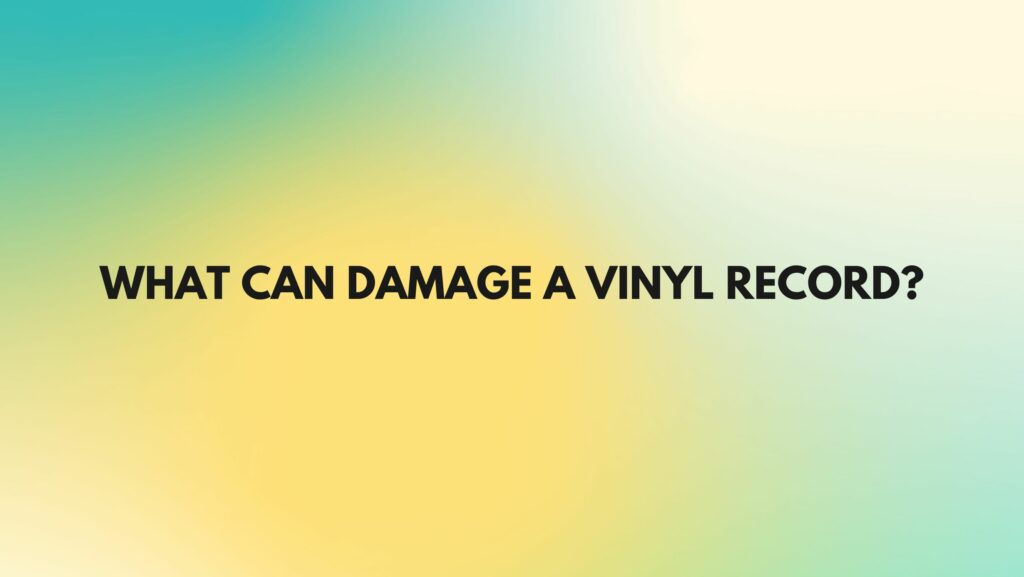Vinyl records are beloved for their analog warmth and immersive listening experience, but they are also delicate and susceptible to various forms of damage. To preserve the longevity and sound quality of your vinyl collection, it’s essential to be aware of the factors that can harm your records. In this comprehensive article, we will explore the common threats that can damage vinyl records and provide tips on how to protect them.
- Physical Damage
Physical damage is one of the most immediate and visible threats to vinyl records. Common forms of physical damage include:
a. Scratches: Scratches on the record’s surface can result from mishandling, improper storage, or contact with sharp objects. These scratches can cause audible pops and clicks, affecting the sound quality.
b. Warping: Excessive heat or exposure to direct sunlight can lead to warping of vinyl records. Warped records are difficult to play and may cause stylus mistracking.
c. Cracks: Cracks in the vinyl can occur due to heavy impact or pressure. These cracks often render the record unplayable and can even damage the turntable’s stylus.
d. Ring Wear: Ring wear happens when records are stored improperly, causing damage to the album cover that can affect both the cover’s appearance and the record’s edge.
- Dust and Debris
Dust and debris can accumulate on the surface of vinyl records and in the grooves. These contaminants can lead to various issues, including:
a. Surface Noise: Dust and debris can cause surface noise, such as crackling and hissing, as the stylus moves over the record’s surface.
b. Groove Damage: Particles trapped in the grooves can scratch the vinyl and impact sound quality. Over time, these contaminants can wear down the grooves, leading to permanent damage.
c. Stylus Damage: The stylus can also be damaged by dust and debris, reducing its tracking ability and causing distortion.
- Improper Handling
Improper handling is a leading cause of vinyl record damage. To protect your records, follow these handling guidelines:
a. Always hold records by their edges, avoiding contact with the playing surface.
b. Use a soft, lint-free cloth to clean the records before and after playing.
c. Be cautious when inserting and removing records from the sleeve, as improper technique can result in scratches and scuffs.
- Storing Records Incorrectly
Improper storage can expose your vinyl records to various risks. To prevent damage, consider the following storage guidelines:
a. Store records vertically, not stacked horizontally, to prevent warping and ring wear.
b. Keep records in a cool, dry environment, away from direct sunlight and extreme temperature fluctuations.
c. Use anti-static inner sleeves to reduce static buildup and protect against dust and debris.
d. Store records in a polythene or polypropylene outer sleeve to prevent ring wear and cover damage.
- Subpar Turntable and Cartridge
Using a low-quality turntable or cartridge can also harm your vinyl records. Inexpensive turntables may have heavy tracking forces or poor stylus alignment, leading to groove wear and mistracking. It’s advisable to invest in a quality turntable and cartridge to protect your records and ensure the best sound quality.
- Poor Cleaning Practices
Regular cleaning is essential to maintain the condition of your vinyl records. However, improper cleaning practices can be damaging. Use a dedicated vinyl brush, anti-static brush, or a record cleaning machine designed for vinyl to safely remove dust and debris. Avoid harsh cleaning chemicals or substances that can damage the vinyl or affect the sound quality.
- Improper Tracking Force
Setting the correct tracking force on your turntable is essential for preserving your records. A tracking force that is too high can cause groove wear, while one that is too low can result in mistracking. Consult your turntable’s manual or the cartridge manufacturer’s recommendations for the appropriate tracking force setting.
Conclusion
Vinyl records are valuable and cherished for their unique sound and cultural significance. To protect your vinyl collection, it’s crucial to be aware of the potential threats that can damage these delicate analog treasures. By following proper handling, cleaning, and storage practices, you can enjoy your vinyl records for years to come, preserving their sound quality and ensuring that they remain in excellent condition.


